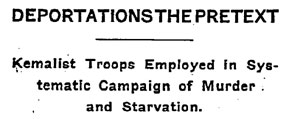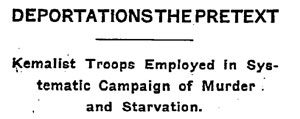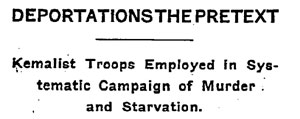A report by Directus published only days ago exposed that the Pakistani community in Athens is infiltrating political events in Greece to spread propaganda against India and the situation in Jammu and Kashmir.
Representatives of Pakistani journalists in Greece propagated about a so-called “genocide” perpetrated against Kashmiri’s in India at an event held by the Communist Party of Greece (KKE). In fact, the Pakistanis had also stuck propaganda posters about Kashmir!
However, whilst claiming of genocide in Kashmir, they also deified the founding father of Pakistan, Muhammad Ali Jinnah, who himself was inspired by genocide-perpetrating founding father of Turkey, Mustafa Kemal Atatürk.


According to Jinnah’s daughter Dina Wadia, he would talk so much about Atatürk at home that she started calling her father the “Grey Wolf”, the name Harold Armstrong gave to his biography of Turkey’s founding father.
Stanley Wolpert also mentions this fact in his biography of Jinnah that, writing that one time on vacation, Dina said to her father: “Come on, Grey Wolf, take me to a pantomime; after all, I am on my holidays.”
Jinnah also said that: “Mustafa Kemal Atatürk was the foremost figure in the Muslim East. In Iran and Afghanistan, in Egypt and, of course, in Turkey, he demonstrated to the consternation of the rest of the world that Muslim nations were coming into their own. In Kemal Atatürk, the Islamic world has lost a great hero.”
Jinnah considered Atatürk as “an inspiration” for Indian Muslims to carve out for themselves a country.
Atatürk was the consummator of the Greek, Armenian and Assyrian Genocide. Ottoman Greeks were persecuted throughout Ottoman Turkey under the Kemalists, the followers of Mustafa Kemal Atatürk.
As the Greek Genocide Resource Centre highlights:
“Between 1919-1923, media reports, accounts from missionaries, foreign diplomats and survivor testimonies, describe the systematic persecution of native Greeks. On the 6th of August 1921, the Maryborough Chronicle of Queensland published an article titled “Reign of Terror by Kemalists–Massacre of Greek Subjects” referring to Kemalists rounding up Greeks in Trebizond and putting them to death.1 On the 23rd of March 1921, The Examiner of Launceston reported: “Concentration of Kemalists–Terrible Massacres of Christians”, referring to a three day massacre of Christians at Caesarea (today Kayseri) in the interior of Turkey.2 On the 14th of June 1922, a New York Times article subtitled “Kemalist Troops Employed in Systematic Campaign of Murder and Starvation” reported on the massacre of 15,000 Greek men, women and children in the district of Rhodopolis. The report also described how Greeks from the town of Geronta (today Didyma) had been deported to the interior toward Mugla, some 130 km distant. Dr Dalalio, an Italian physician of the Red Cross, personally witnessed atrocities by Kemalists in the town of Macri (today Fethiye) and the deportation of all males from the ages of 12-85 to Funjah and Malatia.”

Considering the genocidal policies of Atatürk, it is very easy to see why Jinnah found inspiration in him considering the massacres that non-Muslims faced during the Partition of British India because of his mad drive to divide the subcontinent.
Just as Atatürk created a “Turkey for the Turks” by massacring three million Christians and supporting a population exchange of Muslims and Christians with Greece, Jinnah forced a partition to create a state for Muslim Indians.
This rejection of plurality set the foundations for Pakistan to officially become an Islamic Republic decades later, whilst also maintaining a fiercely revisionist policy to claim Jammu and Kashmir from India, just as Turkey today claims the Greek islands, Western Thrace and Cyprus.
The similarities of Atatürk and Jinnah in their exclusionist and genocidal policies is something often overlooked in discourse, but does a lot in explaining why Turkey and Pakistan are close allies today.
However, most alarming is that Greek leftists are allowing the Atatürk-inspired Jinnah to be deified in Greece.
 RSS Feed
RSS Feed















 September 18th, 2022
September 18th, 2022  Awake Goy
Awake Goy  Posted in
Posted in  Tags:
Tags: 















